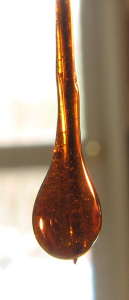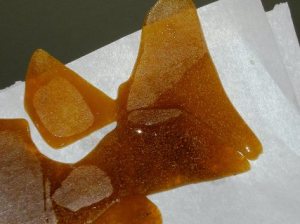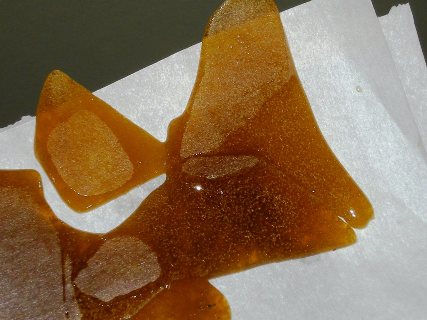
In the 1950s, the ad slogan “A little dab will do ya,” referred to a hair cream called Brylcreem that was supposed to tame a man’s wild hair and make him instantly attractive to women. These days, with the growing acceptance of medical and recreational marijuana, the slogan also applies to a byproduct of marijuana called Butane hash oil (BHO) or wax.
BHO is made by mixing butane with marijuana, and then processing the mixture so that the plant’s cannabinoids are stripped away by the butane from the plant debris. The end result can look like honey or wax. If the amateur chemist doesn’t evaporate their BHO correctly, a lot of impurities are left behind. Johnny Green, a marijuana activist said: “I’m not a doctor, but I can’t imagine that smoking poorly purged butane hash oil is good for your health.”
If the BHO is properly purged, the end result is far purer than raw marijuana. Green said that the highest concentration he has ever heard of THC in marijuana was in the high 20%s. “I have seen a lot of butane hash oil that has ranked in the 80%s and even the 90%s according to reputable testing laboratories.” Concentrations of THC at these levels can cause psychosis and even brain damage, according to DEA special agent Gary Hill. But there is another serious health problem here—butane is extremely flammable.

BHO shatter, Permafrost wax
The Seattle Times reported: “Federal and state authorities in Washington state have filed charges against seven people in connection with a series of suspected hash-oil explosions and fires.” Two of the men injured in the explosion had previously denied to the police that they were making hash oil. They also had medical marijuana cards. The Times article mentioned a separate suspected hash oil explosion that knocked a building SIX INCHES off its foundation.
In Colorado, the burn unit at the University of Colorado only had two previous admissions for hash oil injuries in 2012 when Wayne Winkler was admitted. In 2013, the burn unit admitted 11 burn patients from hash oil fires. By May of 2014, they had admitted ten. At this rate, they will triple their 2013 burn admissions in the first year that recreational use of marijuana is legal in Colorado. You can see a video report on hash oil explosions in Colorado and hear Wayne’s tearful testimony of what happened to him here.
This danger even has marijuana activists like Johnny Green concerned. In addition to the risk that rookies bring to themselves and others, he said it makes the entire movement look bad. In a blog post to “The Weed Blog,” he said:
Consider this a public service announcement. I don’t know if I have hammered this point home enough, but if you are not an expert at making butane hash oil (BHO), PUT EVERYTHING DOWN, TURN OFF THE STOVE, GET YOUR HEAD OUT OF YOUR BUM, AND EXIT THE KITCHEN. Making BHO is a very dangerous thing, and if you slip up in any way, you will no doubt light something on fire, including yourself.
The emphasis above was in the original article. Embedded in the Weed Blog article is a short YouTube video of a homemade attempt to make hash oil gone wrong.
Legalizing marijuana for either medicinal or recreational use will mean easier access to marijuana and lead to a pattern of hash oil explosions like those noted here. States being lobbied by pro marijuana interests should slow down and simply watch what happens in Colorado and Washington state. At the very least, they can learn from the mistakes these earlier “progressive” states have made in drafting their marijuana legislation.
One excellent example is in Colorado. Colorado’s marijuana law allows adults 21 and over to grow up to six plants at home; and hash oil cooks will often use their own plants to make it. Brian Vicente, who helped write the marijuana law in Colorado, said the law’s vague wording that allows processing marijuana plants permits home hash oil production. He did add that he thought the hash oil fires would decline as people realize the dangers and start going to pot shops instead of trying to make their own hash oil at home. That sure was reassuring.





